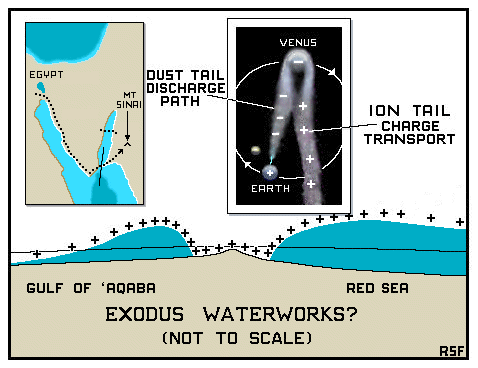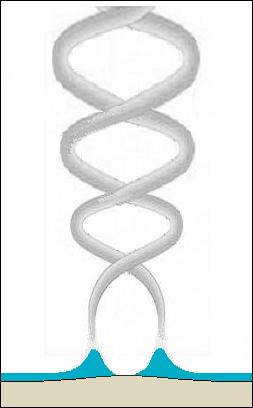Velikovsky's Water Mountain(s)
Shade Tree Physics
Installed some time prior to 01 Jan 2006. Latest update 28 Sep 2016.New or revised information is in bold.
for educational use or research without contacting the author.
In Worlds in Collision(1) Velikovsky mentions the following items in connection with his discussion of the Israelite Red Sea crossing.
The Septuagint translation of the Bible says that the water stood "as a wall,"
and the Koran, referring to this event, says "like mountains." (WIC p.72)
. . .
The Midrashim contain the following description: "The waters were piled up to the
height of sixteen hundred miles," (WIC p. 72)
. . .
When the tidal waves rose to their highest point, and the seas were
torn apart, a tremendous spark flew between earth and the globe of the comet, which
instantly pushed down the miles-high billows. (WIC p. 77)
In an earlier version of this page it was suggested that one water mountain could have "welled up" in the Red Sea (actually the Gulf of Suez) and the other in the Mediterranean Sea. However, recent studies(2) suggest that the Strait of Tiran located at the mouth of the Gulf of 'Aqaba better fits the biblical description for the locale of the sea of passage. These studies also suggest that a mountain named variously as Jabal al Laws, Jebal al Lawz, Jebel el Lawz, and Jebel al-Lawz, which is located in Saudi Arabia some 60 nautical miles northeast of this candidate passage site, is the biblical Mt. Sinai. With these ideas in mind it may be more appropriate to say one mountain welled up in the Red Sea and the the other in the Gulf of 'Aqaba.
A translation of the Bible from Aramaic(2) says the following about the place called Pi-hahiroth connected with the Red Sea crossing.
Speak to the children of Israel that they turn back and encamp
by the INLET OF KHERITHA,(1) between Migdol and the sea, in front of
Baal-zephon; opposite it shall you encamp by the sea. Exodus 14:2
(Emphasis added.)
(1)Dry at low tide.
A footnote in the The New English Bible of the same passage says this about "Pi-hahiroth."
(a) Or where the desert tracks begin.
Note
The electrical discharge which Velikovsky calls a spark may have taken place between the comet's dust tail and the Earth, rather than directly from the comet's globe (Venus) to the Earth. This "closer" communion of electrodes would have permitted localized water mountains to form rather than a global tide. (A global tide would not have been consistent with the reported Exodus phenomenon.)
The electrical charge transfer mechanism, which built up the potential difference between Earth and Venus would have been a flow of positive ions, transported by the solar wind from Venus to Earth in the comet's ion tail. This transfer process would occur whenever the Earth was immersed in the ion tail. Since scripture indicates that the pillar of fire and the pillar of cloud were visible day and night, we could surmise that Earth and Venus were temporarily orbiting each other so that the globe of the comet was nearly geosynchronous with respect to the exodus scene.
Calculations need to be made regarding the electrical charges involved to bring about this temporary geosynchronous interlocking of orbits.
Even though Velikovsky places a lot of emphasis on the electrical charge (and discharge) aspect of the the water redistribution matter, we would be remiss if we didn't come to grips with the unusually strong east wind which was part and parcel to the overall process.
Exodus 14:21 states:
And Moses stretched out his hand over the sea; and the Lord caused the sea to go back by a strong east wind all that night, and made the sea dry land, and the waters were divided.
This strong east wind may have been produced by the earth's positively charged water-bearing atmosphere moving en mass around the earth, being electrically driven in the direction of the comet's negatively charged globe. (At night, assuming the locked orbits, the globe would be the closest part of the comet to Earth. The tail would be oriented away from the Earth.) Exodus 14:19 says that the angel of God and the pillar of cloud moved so as to stand behind the Israelites. To me this means that the comet was to the west of the zenith just prior to the Red Sea crossing. The wind was from the east.
It would seem that the wind started the process, by initially dividing the waters, and electrostatics finished the jobs.
The following drawing illustrates the elements (except for the wind) of the preceding discussion.

The path shown for the Red Sea crossing and the location for Mt. Sinai (in present day Saudi Arabia) are based on Cornuke and Williams' findings. See Mt. Sinai - The Evidence at the Bible Archaeology, Search & Exploration Institute web page. Click on Investigations, then on Mt. Sinai.
According to Jim Pinkoski, the late Ron Wyatt found Mt. Sinai (Jebel el Lawz) four years before Cornuke and Williams "visited" it in 1988. Wyatt is reported as having found evidence that the Red Sea crossing was near the middle of the Gulf of Aqaba, some 70 miles North of its southern entrance. For more on Wyatt's findings, including recent photos of underwater chariot wheels, see Red Sea Crossing. [Added 01 Jan 2006.]
If Wyatt's location for the crossing is correct, then the northern water mountain might have formed in the Mediterranean sea. Velikovsky quotes an ancient source as saying, "Then the Great Sea (the Mediterranean) broke into the Red Sea in an enormous tidal wave." (1, page 73.) [Added 02 Jan 2006.]
In a 2000 article, Gordon Franz(4) contended, contrary to Wyatt's and Cornuke's assertions, that Mt. Sinai was not in Midian. (Moses father-in-law goes [from Mt. Sinai] back to his country of Midian.) He further concludes that Jebel El-Laws is not the biblical Mt. Sinai. (Strongly recommended reading. RSF) [Added 9 Feb 2006.]
This electrostatically induced mountain building effect of water can be easily and inexpensively simulated. Go to the Shade Tree Physics Fun Pages article Kerzot.
Two Heaps?
The issue of having water rising in two separate heaps has long been
a problem to me. How does a single concentration of electrical charge
produce two water mounds? Above, I graphically suggested that the dry land
at the crossing point may have been a catalyst for the separations. Each mound, having like polarity,
should repel the other, but I confess that the matter is less than soul
satisfying. A new 'speculative' scenario rears it's head.
This second scenario is at odds with the first one, above.
If the flow of electricity in the ion tail of Venus were to manifest itself in the form of two (or more) intertwining Birkeland currents, and a pair of those strands made contact with the earth's surface, i.e., the surface of the Red Sea, then each current strand may have produced it's own water mountain. Could the Birkeland current "terminals" have presented a semi-stationary presence for the time required for the crossing? [Added 12 Apr 2009.]

Birkeland Currents and Induced Water Mountains
The currents may also be known as the Kabalistic Tree of Life.
References
(1) Immanuel Velikovsky,Worlds In Collision, (1950) MacMillan, New York(2) See the Doorstep Evangel article Mount Sinai.
(3) George M. Lamsa, The Holy Bible from Ancient Eastern Manuscripts, translated from the Peshitta, (the Authorized Bible of the Church of the East) 14th Edition, A.J. Holman Company, Philadelphia, 1967
(4) Gordon Franz, Is Mt. Sinai in Saudi Arabia?, Bible and Spade, (2000), pp. 101-113. A follow up paper, same subject is: Mt. Sinai is not at Jebel El-Lawz in Saudi Arabia. [Added 09 Feb 2006.]
Top